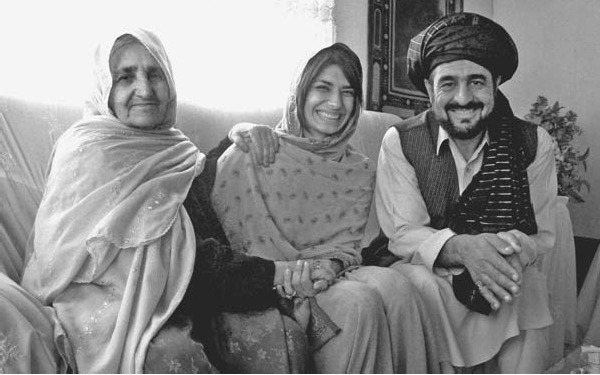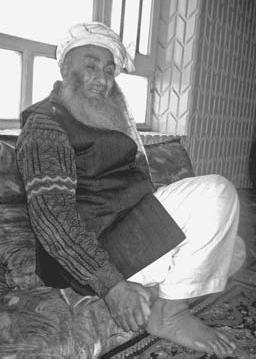My Guantanamo Diary (30 page)
Read My Guantanamo Diary Online
Authors: Mahvish Khan

“I want my children to have a love, to have
meena
—affection—
for Afghanistan,” he explained. “I want them to see to their homeland
while it is free.”
When I called his brother Ismael hoping to get together, I learned
that Mousovi and his family had gone to Gardez for a wedding. So, I
decided to hitch a ride to southern Afghanistan with a local aid
worker. The drive was beautiful, with stunning mountains and the
changing colors of autumn drenching the landscape.
Our car pulled up to Mousovi’s house, and he came out to greet us,
Ismael following close behind.
“Mahvish-jaan, I can’t explain how happy you’ve just made me,”
Mousovi said, clutching my hand.
I was itching to give him a big bear hug, the kind I’d give my
friend Georges from Miami. Georges would show me just how
happy he was to see me by giving me a monster squeeze and picking
me straight up off the floor. I think I fantasized a dramatic reunion
like that with Dr. Ali Shah. But Afghan culture and society throws
up so many intricate barriers between men and women that I had
to settle for the tight grip of his hand and his carefully chosen
words. It was the same at Guantánamo. There were many, many
times when I wanted to console prisoners with a hug. But other
than with Haji Nusrat, it never happened; the culture inhibits it.
I smiled at the doctor and chose my words as carefully as he had.
“Dr. Sahib,” I began, “I’m so glad to finally see you here in your
home. It means more to me than I can explain to you.”
“May Allah always keep you happy,” he said and then, “
Raza, raza
—Come, come,” as he ushered me into the house, where I met
his mother, a little old lady who immediately embraced me tightly
and proceeded to plant kisses all over my face and head. She held my
hand for the next several hours. “I feel like my daughter has come to
visit,” she announced. I channeled the affection I felt for Ali Shah toward
his kind mother.
The doctor told the story of the moment we first met, when both of
us were nervous about whom we would be meeting. I expected a terrorist;
he, perhaps an abusive interrogator. I walked in and saw a
nervous pediatrician standing at the back of the room. He saw me
under an Afghan shawl and mistook me for his sister. “I really
thought it was Parveen, that she had come to see me somehow,” he
said.
The sight of Dr. Mousovi at his house was slightly surreal. I had
only known him as a gentle, white-bearded man with chains around
his feet. Seeing him at home with his family, just as I’d always
prayed he would be again, allowed me to feel the weight of everything
I’d held back during our Camp Echo meetings. He’d been the
first prisoner I met, and the impact of that initial meeting was
greater than most of my meetings with other prisoners. He was the
first to break down my biases and to show me what sort of injustice
my country had committed against good, kind people. I realized that
I hadn’t allowed myself fully to feel all the effects of that until now,
when I saw Dr. Ali Shah safe and free.
Being at his house was like being at the home of an uncle. I
poured green tea for the doctor and his mother into small, clear tea
glasses, and they filled bowls with red pomegranate seeds. I helped
his mother carry in dishes of rice, yogurt, meat, and eggs. They were
wonderful hosts; there were no formalities. We talked, walked in and
out freely, sometimes sat on the couch, sometimes on the floor. And
following custom, everyone encouraged everyone else to eat.
I couldn’t stay late because I’d been told that it wasn’t safe to drive
through the south at night, but I ended up lingering anyway. It was
hard to leave. Mousovi and his mother kept pressing me to stay for
the wedding of a relative from the extended family. His nieces presented
me with sparkly orange wedding bangles, and his mother gave
me a pretty embroidered white shawl.
When I had to go, his mother embraced me tightly, while Dr. Ali
Shah sat on the floor on his knees looking on. “Our hearts don’t
want you to leave,” he said. “This is your home too.”
I wasn’t good at this impromptu poetic word game, and I was a
bit overwhelmed at seeing him so happy, so I simply said, “I’ll see
you again soon, and we’ll stay in touch.” As he walked me out, he
told me how much our friendship meant to him.

Dr. Ali Shah, his mother, and I at his Gardez home.
Photo by Lal Gul.
“We’ll have this special thing forever, though it started in the most
unlikely of places,” he said.
“I know what you mean,” I replied. “You’re like family.”
I wished him fun at the wedding that night. “Weddings are happy
occasions,” he said. “You coming to my house today was like the
happiness of two weddings for us.”
I think that made up for the bear hug.
Some of the men I met at Guantánamo have been released, but
many have not. Haji Nusrat’s captivity had a bittersweet ending.
In August 2006, the eighty-year-old was released as unexpectedly
as he’d been arrested. Like Ali Shah Mousovi, he was given a hero’s
welcome in Yakhdan, his native village in Sarobi, by hundreds of
visitors who had streamed in for the homecoming.
Nusrat’s family immediately began to entertain well-wishers, including
a few Americans—U.S. military officers stationed at a
Sarobi base who dropped by to see what all the commotion at his
home was about. The American soldiers were treated just as warmly
as the Afghan guests, invited in and offered green tea.
“They greeted me and said they were sorry for what had happened
to me,” Nusrat told me later. “I told them I had forgiven
them.”
I trekked to Sarobi in November 2006. I was greeted by Abdul
Wahid, Nusrat’s son, a tall man with light brown eyes, who led me
into a guesthouse room lined with red cushions. I took my shoes off
and sat down as someone brought in pastries and nuts and Abdul
Wahid poured tea.
I could hear the sound of Haji Nusrat’s voice outside. He was
speaking to some visitors, who continued to stream in four months
after his release. He didn’t know I was
coming, so when he stuck his head
through the window to see who his
next visitor was, his face lit up in surprise.
His sons helped him into the
room, and he sat next to me on the
cushioned floor.

Haji Nusrat.
Author photo.
“
Bachai
, you kept your promise. I
knew you would,” he said.
“I’m so happy to see you here,” I
told him. He was so different from the
way he’d been at Gitmo, much calmer
and more peaceful.
“
Bachai
, what happened to me was
cruel,” he said. “I suffered a big injustice.
It was not a small injustice.”
I asked him about his release.
“My release,” he said leaning back into the pillows, “left me
ne khushala, ne khapa
—not happy, not sad. I didn’t want to leave my
son behind.”
When he was led out of Camp 4, Nusrat said, “Izatullah came up
to the edge of the fencing and said, ‘
Khudai-pa-aman
—May God’s
peace be with you.’ I gave him my hand, and then I had to leave
him.”
“He must have been happy for you, but also sad,” I said.
“No, my son was happy. He was happy that his father was being
released. I was sad.”
I spent the day at Nusrat’s because Afghans are so insistent that a
guest stay as long as possible. An Afghan guest is typically offended if
tea is not offered. Then, the host usually insists that the guest par-
take of the next meal. So, when lunchtime came around, there was
no question that I would be staying. We went into another room,
where I was surprised to see a satellite TV, and had an elaborate
communal meal. Nusrat sat next to me on the floor. I was a little surprised,
again, to see him drink Nestle bottled water instead of tap or
boiled water. He handed me a can of Pepsi, and his sons and grandsons
brought in two-foot pieces of fluffy bread. They laid out
chicken, lamb, rice, spinach, soup, and potatoes on a floor mat.
As people bustled about, I talked quietly to Haji. Then, he remembered
something and started yelling for his son, who had stepped out
of the room.
“
Waa Abdul Wahiddaa
!” he yelled. “Come in here and bring
that box.”
I was amused at the way he ordered his son about. Abdul Wahid
waited on his father hand and foot and never complained.
“
Waa Abdul Wahiddaa
!”
Finally, the twenty-seven-year-old came in holding a box wrapped
in sparkly blue-and-white paper and tied with long, colorful ribbons.
As he walked toward us, holding the box out to me, Nusrat stopped
him.
“Give it to me. I want to give it to her,” he grumbled.
Abdul Wahid passed him the box, and Nusrat passed it to me.
“As I have said before, you are like my own child,” he said. “Our
friendship will be strong and will last forever. Don’t ever let it go.”
“Of course not, I wouldn’t,” I responded. I thanked him for the
gift. I opened it, careful not to rip the shiny wrapping. It was a thick
brown embroidered shawl. I knew I would treasure it for years to
come.
Nusrat introduced me to his extended family and other guests who
had stopped by for lunch and told them the story of how we met.
Then, we ate out of assorted plates and bowls of food, using the bread
in place of utensils. Haji placed small saucers of salt and pepper in
front of me and put pinches of both on my chicken and spinach. As we
ate, I asked Baba, as he now insisted I call him, about his health. He
paused between slurps of brothy soup and asked a favor.

Haji Nusrat and his son Abdul Wahid having lunch in Sarobi.
Author photo.